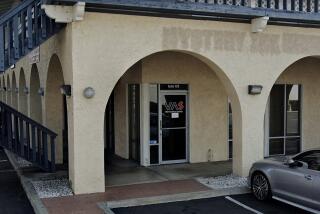American Continental Sues Regulators for $768 Million Over Lincoln Seizure, Leaks
- Share via
PHOENIX — The parent company of Lincoln Savings & Loan filed court documents Tuesday accusing a high-ranking regulatory official of illegally leaking damaging information about the Irvine-based thrift to reporters and others.
In addition, an amended complaint and a new lawsuit filed by American Continental Corp. of Phoenix seek a total of $768 million in damages from government defendants, including $568 million for the wrongful confiscation of Lincoln by federal regulators.
In the amended suit, filed in U.S. District Court in Phoenix, American Continental claims that Darrel W. Dochow of the Federal Home Loan Bank Board was among a number of regulators who illegally disclosed “highly confidential and inaccurate information” about Lincoln.
Tuesday’s filings are part of an intensifying courtroom battle over control of Lincoln Savings and the financial future of American Continental, its parent company.
The Phoenix suit was amended to streamline allegations and to add Dochow as a defendant. Other regulators, not yet named, will be added as their identity is determined, the suit said.
The new lawsuit, filed in the U.S. Claims Court in Washington, D.C., claims the government seized private property--Lincoln Savings--without just compensation in violation of the 5th Amendment to the Constitution.
Dochow, director of the bank board’s Office of Regulatory Affairs, and other bank board executives could not be reached for comment Tuesday.
American Continental, headquartered in Phoenix, filed a petition on April 13 to protect itself from creditors while it tries to reorganize its debts under Chapter 11 of the federal bankruptcy laws. The bank board seized Lincoln the next day, saying the company was operating it unsafely and dissipating its $5.3 billion in assets.
American Continental’s chairman, Charles H. Keating Jr., has maintained that regulators illegally leaked confidential information in a vendetta against his company and Lincoln. Keating has claimed that government officials resented his vocal opposition to new rules limiting the kinds of investments S&Ls; can make.
In announcing Tuesday’s legal actions, Keating said in a prepared statement that the “improper leaks” damaged and continue to damage Lincoln and American Continental by contributing to a loss of deposits, decreased market value for American Continental stock and the “termination or impairment of important banking and other business relationships.”
In the amended suit filed in Phoenix, American Continental seeks $200 million in compensatory and punitive damages for wrongful leaks and injunctions against further leaks and other violations by the bank board.
The suit claims that Dochow was the “unidentified regulatory official” who was quoted in a news report in March as saying that “Lincoln Savings & Loan must be sold quickly or it will be seized.”
That comment caused a “serious run” on Lincoln’s deposits, the suit said. Company officials have said previously that depositors withdrew $70 million in the days following that report, and Keating said total deposits have plummeted by $400 million since regulators seized it.
The suit also accuses the bank board of violating its own rules by using Kevin O’Connell, an examiner who was allegedly biased against Lincoln, in its investigation of the S&L.; His father, William, severely criticized Lincoln’s operations while he was head of an S&L; trade group, the suit contends.
Violation Claimed
In the new suit filed in Washington, American Continental is seeking $568 million in damages resulting from the seizure of Lincoln. The suit claims the bank board violated a 1988 agreement between Lincoln and regulators over how the agency would conduct a new examination of the S&L.;
The suit is in addition to a previous one filed there that seeks to overturn the conservatorship imposed by regulators and to return control of the S&L; to the company.
More to Read
Inside the business of entertainment
The Wide Shot brings you news, analysis and insights on everything from streaming wars to production — and what it all means for the future.
You may occasionally receive promotional content from the Los Angeles Times.










